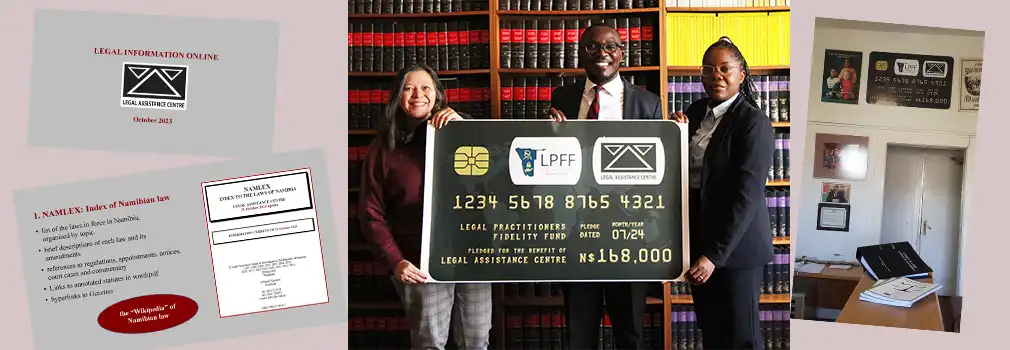NEWS
 Probono 96 – Government Watchdogs
Probono 96 – Government Watchdogs
Government watchdogs are organisations, bodies or individuals that monitor the activities of government entities, to ensure accountability, transparency, and adherence to laws and regulations. Their primary role is to alert the public or take legal action when they identify activities that may go against the public interest. This monitoring can include scrutinizing government spending, investigating potential fraud or corruption, and advocating for policy changes. Government watchdogs play a crucial role in monitoring the actions of public officials, public offices, safeguarding citizens’ rights, and promoting ethical conduct within the government. The Constitution has adopted several mechanisms to safeguard the integrity amongst government bodies or entities and to protect the rights of all Namibians. More…
 Medical Negligence in Namibia: A Growing Concern Highlighted by the Theonistar /Naris Case
Medical Negligence in Namibia: A Growing Concern Highlighted by the Theonistar /Naris Case
Medical negligence is a serious issue in Namibia, where the healthcare system faces significant challenges, including understaffing, resource shortages, and administrative inefficiencies. These issues often contribute to preventable medical errors, raising concerns about patient safety and accountability within the healthcare system. One such case that brought the issue of medical negligence to the forefront is the tragic death of Theonistar /Naris, which has drawn national attention and highlighted the potential legal consequences of medical failures. The case began in 2018, and the Plaintiffs, Theonistar’s parents, were represented by Chloe Brandt of the Legal Assistance Centre, while Mr. Lindrwoski Tibinyane defended the Ministry of Health & Social Services and the Government of Namibia.
Background of the Case
Theonistar /Naris, a minor child, was admitted to Khorixas State Hospital in April 2018 for a routine tonsillectomy. A relatively common procedure, tonsillectomy is usually low-risk, but complications can arise, particularly in children. Theonistar underwent the surgery on April 10, 2018, but her condition deteriorated soon after, culminating in her death on April 14, 2018, due to post-operative bleeding and hypovolemic shock.
The plaintiffs, Theonistar’s parents, filed a lawsuit against the Ministry of Health & Social Services and the Government of Namibia, alleging negligence in the treatment and post-operative care of their daughter. The legal battle focused on whether the doctors and medical staff at Khorixas State Hospital had adequately monitored and responded to signs of post-operative complications, particularly the excessive bleeding that led to Theonistar’s death.
 Medical Negligence Highlighted
Medical Negligence Highlighted
Medical negligence has long been a critical issue in Namibia, and in a settlement on 12 September 2024, the Theonistar Naris case brings both closure and reflection on the importance of accountability in the medical field. The case, which began in 2018, shone a spotlight on the challenges within the healthcare system, particularly in ensuring patient safety and the need for improved standards of care. Representing the plaintiffs, Chloe Brandt (LAC), fought to secure justice for Theonistar’s family, demonstrating the vital role of legal professionals in addressing systemic failures.
Mr. Lindrwoski Tibinyane, representing the Ministry of Health & Social Services and the Government of Namibia, defended the actions of the medical professionals involved. However, the outcome of the case, culminating in a court settlement, signifies a pivotal moment. It is a step forward in addressing the wider issue of medical negligence, which affects vulnerable patients who rely on the medical system to safeguard their health and lives.
The settlement, while bringing emotional relief to the /Naris family, also underscores the need for reforms in medical practice and procedures, especially in rural hospitals like Khorixas State Hospital.
For the Legal Assistance Centre, this case serves as a powerful reminder of the importance of upholding human rights in the healthcare system. The LAC highlights medical negligence, contributing to the ongoing dialogue around patient safety and legal responsibility within Namibia’s healthcare system. Theonistar Naris’s story will continue to inspire efforts toward ensuring that such incidents are prevented in the future, and that justice remains accessible to all.
For the Plaintiffs, the case is not only about seeking justice for their daughter but also about holding the healthcare system accountable to prevent future tragedies.
Link to Newspaper and also as previously reported in the news.
 Meeting with African Centre for Governance
Meeting with African Centre for Governance
On the 20th of August 2024 the LAC Director, Toni Hancox, met with the African Centre for Governance. 
The Centre will be conducting election observations during the forthcoming elections and requested to meet and to discuss the current political environment as well as the socio-economic situation within Namibia.
 NAMLEX has been updated to July 2024
NAMLEX has been updated to July 2024
LPFF has donated N$168,000 to assist with that
The amount will be used for updating the legal database of the LAC, which is made freely available for use by legal practitioners, the judiciary, the press, students and the general public. Expressing gratitude for the donation, Toni Hancox said that updating the database is vital to preserve the capability and understanding of all those who need to access and use the law. However she went on to say that as the legal environment is dynamic and new laws are enacted and regulations are amended, this places responsibility on the LAC to ensure that the database is current and information is kept up to date.
Detailed information on how to use the databases are here.
Pictured at the handover of the donation are our Director, Toni Hancox, Pius Iikwambi, member of the LPFF Board of Control, and Taimi Iileka-Amupanda, member of the LPFF Board of Control.
 Probono 94 – Understanding the Public Gatherings and Demonstrations Law of Namibia
Probono 94 – Understanding the Public Gatherings and Demonstrations Law of Namibia
The Demonstrations in or near Court Buildings Prohibition Act 71 of 1982 and the Public Gathering Proclamation 23 of 1989 are legal frameworks that regulate public gatherings and demonstrations to ensure public order and safety. While both laws aim to balance the right to freedom of speech, assembly, and association. More here…
Further information may be found in our Summaries as well as on our Advocacy pages.
Celebrating our 36th birthday!
 This year we were celebrating our birthday by providing a hot meal to a worthy charity. Selected by our GRAP Department we will have the soup kitchen at the Family of Hope Services, Okuryanga.
This year we were celebrating our birthday by providing a hot meal to a worthy charity. Selected by our GRAP Department we will have the soup kitchen at the Family of Hope Services, Okuryanga.
Please take a look at what they do on their website.
 Presciption overruled in the Police Act
Presciption overruled in the Police Act
Any civil proceedings against the State or Police Officers acting in terms of the Police Act 19 of 1990 (“Police Act”), shall be instituted within 12 months after the incident. Only the Minister may waive compliance with the above requirement. The Act currently makes no provision for minor or insane persons.
In a Police brutality civil claim, our Chloe Brandt, successfully argued a Special Plea on behalf of the Third Plaintiff, who was a minor at that time. This case sets a precedent against the shortcomings of the Police Act, particularly with regard to Minors and insane persons under custodianship.
In the Judgment delivered on 14 June 2024, Justice Masuku found that in the event that Civil Proceedings are instituted against the State or Police Officers, and the Defendants have not brought evidence to show or suggest that their acts were carried out in pursuance of the Police Act, they may be viewed to have acted solely within the course and scope of their employment. The judgment is pertinent in that it serves as a judicial precedent that, if at the time the cause of action arose, the Plaintiff was a minor, the prescription period only starts running from the date on which such minor attains majority.
More on Prescription in our ProBono and more on the case here.













